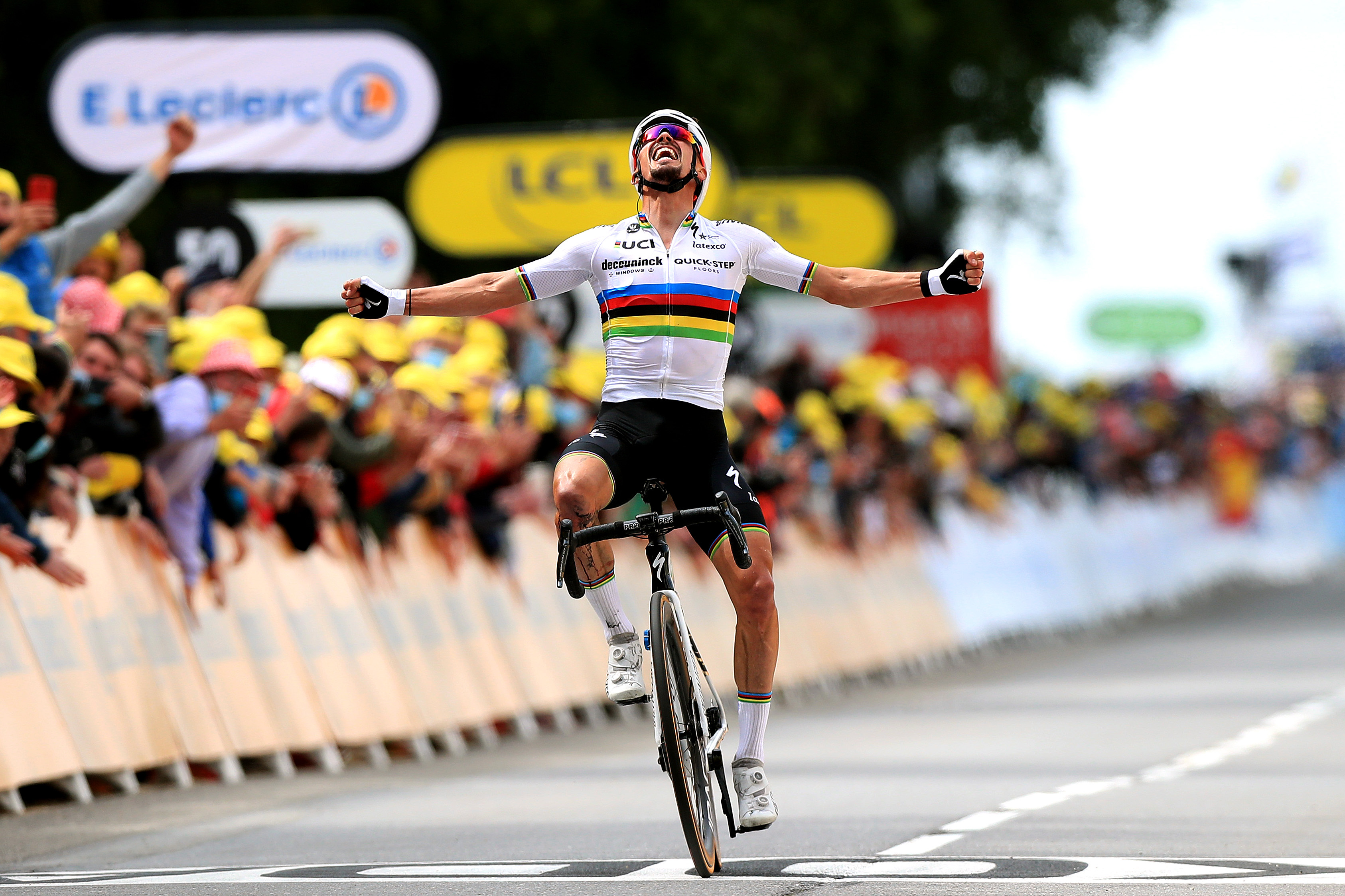Tour de France stage 1: A victory for Julian Alaphilippe and a victory for France
The opening stage of the Tour was won by the darling of the French public and it is just what cycling in the country needs

The Tour de France needed this. Amid a hectic summer of sport, with France being one of the favourites for European Championships, Tour organiser Christophe Prudhomme designed a Tour opening with Julian Alaphilippe (Deceuninck-QuickStep) in mind. In order to get any kind of traction in the country at last, away from the die-hard cycling fans, the Tour needed Alaphilippe to deliver. Well, he delivered.
We all know that France has not had a Tour winner since Bernard Hinault in 1985, but the country has not even won the opening stage proper of their national race since 2006, with Jimmy Casper, or any kind of opening stage since 2000, with Christophe Moreau. This is something new.
Alaphilippe surged with 2.3 kilometres to go, held off the rest of the bunch and the best puncheurs in the world, and triumphed. He could not be stopped once he got going, and never looked like coming back. The Frenchman will swap rainbow bands for the yellow jersey tomorrow, which guarantees his presence on the front of French newspapers tomorrow: this will cause exactly the buzz that Prudhomme and the Tour need in order to be relevant.
It was reminiscent of the World Championships road race that he won last year, in that once he had flown away at a decisive point, it was race over. The Deceuninck-Quick Step rider’s acceleration was breathtaking, clearly planned with pinpoint accuracy. Just like in last October’s Worlds road race, Wout van Aert ( Jumbo–Visma) was left behind chasing; his fellow riders did not want to tow him to the finish, and Van Aert could not do it all on his own. There was a brief moment of excitement when Primož Roglič (Jumbo-Visma) attacked behind, and Tadej Pogačar (UAE Team Emirates) responded, but that was a flame that briefly flickered before being extinguished. Neither wanted to help the other one gain time so early in the race. It didn’t matter, anyway, as Alaphilippe was already gone.
French cycling needed this. Those who have been thought of as contenders for the Tour over the last decade have now faded, with apologies to the still-good Romain Bardet (Team DSM) and Thibaut Pinot (Groupama-FDJ). There are other, younger riders who might be better GC prospects in the coming years, like the Groupama-FDJ pair of David Gaudu and Valentin Madouas. However, none have the personality, the sparkle, the ability to take cycling beyond its traditional heartlands as Alaphilippe, as was seen during his time in yellow in 2019.
The Tour is sometimes seen as a bit staid, emblematic of old France. The checked tablecloths, the bunting, the pensioners outside the tabac waiting for the race to come past. Alaphilippe can change that, with his attacking racing attractive to the TikTok generation. This is cycling at its most exciting and marketable.
Alaphilippe also needed this. The Frenchman has been the best rider on punchy finishes for a couple of years now, best exemplified by his three wins at La Flèche Wallonne. Yet he has been under threat from a new generation of puncheurs, led by Van Aert and Mathieu van der Poel (Alpecin-Fenix). Van der Poel wore a special yellow and purple kit paying tribute to his grandfather, Raymond Poulidor, and is the coming man, but like his grandfather he has not worn the yellow jersey. He was looking to be the 19th rider post-war to win his debut Tour de France stage.
Get The Leadout Newsletter
The latest race content, interviews, features, reviews and expert buying guides, direct to your inbox!
The Deceuninck rider put down a marker to those pretenders to his throne that this is his territory, that he is still the very best on these finishes. Tomorrow sees a similar punchy finale to today, on the climb above Mûr-de-Bretagne, and few would bet against him repeating this feat again.
There is the question of just how far Alaphilippe can go in yellow, whether he can sustain another run in the GC as he did in 2019. The two time trials may be a bit too flat for him, more designed for a specialist, not like the punchy course that he won on in Pau. His Deceuninck team is certainly not set up to support a challenge for the maillot jaune, with a sprinter and lead-out men rather than mountain domestiques, and so he will not be able to compete with Jumbo-Visma or Ineos Grenadiers on that front.
The Frenchman knows this, and also knows how his instinct to attack might harm his overall chances. He told L’Equipe before the race: “I don't know if I'd be capable of starting the Tour de France telling myself that I wasn't going to attack even once, in order to preserve my resources, because I'd be focused completely on the GC. What would be the point of riding if I couldn't attack?”
It is worth noting, though, that the last world champion to win the opening stage of the Tour was Hinault in 1981. Also, Alaphilippe’s bib number for the race is 51. Hinault’s number for his debut Tour victory in 1978? The same.
Procycling magazine: the best writing and photography from inside the world's toughest sport. Pick up your copy now in all good newsagents and supermarkets, or get a Procycling subscription.
Adam Becket is the staff writer for Procycling magazine. Prior to covering the sport of cycling, he wrote about ecclesiastical matters for the Church Times and politics for Business Insider. He has degrees in history and journalism. A keen cyclist himself, Adam’s favourite race is the Tour of Flanders or Strade Bianche, and he can't wait to go to the Piazza del Campo for the end of the race one day.